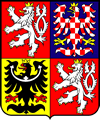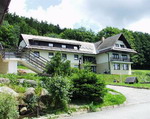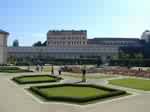Travelling, Accommodation, Holiday, Free time
Bohemian, Moravian, Silesian

Republic of AustriaRepublik Österreich Countryname short form: Austria Capital: Vienna
Embassy of the Austira Republic Name of ambassador: Dr. Margot Klestil-Löffler Viktora Huga 10 Telephone: +420257090511 Fax: +420257316045 E-mail: austrianembassy@vol.cz
Embassy of the Czech Republic in AUSTRIA Penzingerstrasse 11-13 Telephone: 0043189958-0 Fax: 004318941200 E-mail: vienna@embassy.mzv.cz
|
|
Main information |
|
|
Border countries: |
Germany , Czech Republic, Slovakia, Hungary, Slovenia, Italy, Switzerland, Liechtenstein |
|
Continent: |
Europe |
|
Location: |
° ' West longitude to 13 20° ' Earth longitude 47 20° ' North latitude to ° ' South latitude |
|
Area: |
83 858 km2 |
|
Time zone: |
GMT +1 (v létě +2) |
|
Official language: |
Germany |
|
Other languages: |
|
|
Currency: |
1 EURO (EUR, ?) = 100 EURO CENT |
|
Climate: |
Temperate; continental, cloudy; cold winters with frequent rain in lowlands and snow in mountains; cool summers with occasional showers |
|
Cities: |
Graz, Linz, Salzburg, Insbruck, Klagenfurt, Villach, Wels, |
Politics |
|
|
Government type: |
Federal republic |
|
The adminstrative structure: |
|
|
The head of state: |
Dr. Heinz Fischer |
|
Prime Minister: |
Dr. Wolfgang Schüssel |
Population: |
|
|
Population: |
8,1 mil. (2001) |
|
Growth of population: |
0,25 |
|
Population density: |
96 person/km2 |
|
Life expectancy: |
Male: , Female: |
|
Age structure: |
|
|
Religion: |
Roman Catholic 79%, Protestant 5%, Atheist and other 17% |
|
Ethnic groups: |
Austrian 90,9%, non-nationals 9.1% (includes Croatians, Slovenes, Hungarians, Czechs, Slovaks, Roma), naturalized 2% (includes those who have lived in Austria at least three generations |
Economics |
|
|
GDP: |
221,42 Mrd. EUR (2004) |
|
Export: |
89.131 in Mio. EUR (2004) |
|
Import: |
89.421 in Mio. EUR (2004) |
|
Subscriber countries: |
Germany, French, Italy |
|
Supplier countries: |
Germany, French, Italy |
|
Unemployment: |
7,1% |
Useful information |
|
|
Calling code |
+43 |
|
Top level domain: |
.at |
|
Voltage: |
230 V, 50 Hz |
|
Important telephone numbers: |
|
|
Road traffic: |
Right hand traffic |
|
International country code: |
AUT |
|
Car's license plate: A |
|
Ambassador: |
|
Oficiální pořadané akce v období 27.12.2024 až 27.01.2025 |
|
|
HISTORY |
|
Austria?s history since the 13th century is bound up with that of the Hapsburg family. The region was conquered by Charlemagne and remained a part of the Holy Roman Empire. By the 16th century, the Hapsburgs had gained a firm grip on the title of Emperor, although their power owed less to this often empty distinction than to the extensive family lands, many of which were to be found in Austria. Under Charles V, Austria was part of a vast empire, however, after Charles? abdication in 1556, the Spanish and Germanic parts of his lands were separated, passing to his son and his brother respectively. |
PHOTOGALERY |
||||||||
|
No photo
|
Saturday 28.12. |
|
 |
25°C |
Sunday 29.12. |
|
 |
23°C |
Jakému způsobu výběru dovolené dáváte přednost ?
•
Doporučení kamaráda
![]() 26% (22893)
26% (22893)
•
Sezónní katalog cestovních kanceláří
![]() 18.9% (16665)
18.9% (16665)
•
Nabídka z reklamních letáků
![]() 19% (16760)
19% (16760)
•
Last minute
![]() 18.4% (16177)
18.4% (16177)
•
Prostřednictvím internetu
![]() 17.7% (15643)
17.7% (15643)
Number of contender 88138
Enter your e-mail for sending news from server E-Czechia.cz.
Copying, publishing and spreading of this server www.e-cesko.cz is recommended and acceptable. We hope that users will enjoy using materials from server www.e-cesko.cz and they will spread this address further. Project E-CESKO.cz came in the existence thanks to the government grant of the Ministry of Regional Development of the Czech Republic.















